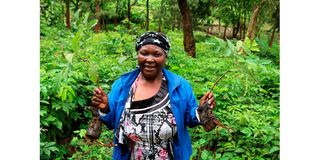Why experts want more women in environmental conservation

Zipporah Gathoni Ngatu of Iriene Mazingira Women Group in Meru, holds tree seedlings at their Mwendantu nursery. Environmentalists want a review of laws to ensure active involvement of women in conserving the environment.
What you need to know:
- Experts warn that locking women out of land ownership is slowing environmental conservation in Kenya and in the continent.
- They want the integration of gender perspective in mitigating and adoption activities in matter climate change.
Environmentalists want a review of laws and regulations to ensure active involvement of women in conserving the environment. The experts warn that locking women out of land ownership is slowing environmental conservation in Kenya and in the continent.
This is despite women bearing the brunt of the effects of climate change. United Nation’s agency Food Agricultural Organisation 2011, UNFPA 2009 and UNDP 2015 indicate that 80 per cent of people displaced by climate change are women and children.
Experts in the country want the integration of gender perspective in mitigating and adoption activities in matter climate change as well enforcement of policies that ensure greater role of women in biodiversity conservation.
Dr John Chumo, committee secretary at National Environmental Complaint Committee (NECC) observes that lack of land ownership rights limit decisions on what to plant on a particular parcel of land.
“More often, women cannot make the decision to plant trees or flowers or engage in biodiversity on a parcel of land without permission from their husbands. This tends to limit women from actively involving themselves in conserving the bio-diversity or environment,” says Dr Chumo.
Land use
He observes that when women participate in conservation and land use decision-making, resources are more equitably distributed in communities.
In communities around the world, women are responsible for domestic and household chores and through that, they get to interact more intensively with the natural environment. For instance, they act as farmers, collectors of water, firewood and medicinal plants hence, have a close connection with their local environment. Consequently, through this direct contact with the environment, they tend to have deep knowledge about the environment.
“Studies indicate that women of today are significant actors in natural resource management, and they are major contributors to environmental conservation, sustainable development, and adaptation to climate change. For instance, the 1992 United Nations (UN) Earth Summit, India’s Chipko movement, and Kenya’s Green Belt Movement all highlighted the role of women’s voices and perspectives in sustainable development. Lately, we have women’s movements that advocate and demand better protection of natural resources,” says Dr Chumo.
Plantation forests
For instance, there is the Plantation Establishment and Livelihood Scheme, a mechanism used by Kenya Forest Service to establish plantation forests, which they allocate portions to local communities formed under Community Forest Associations to cultivate and produce certain crops while tending the young seedlings up to three years.
“The survey indicates that women are the majority beneficiaries of these schemes therefore, their contribution to forest conservation ought to be captured correctly,” the researchers say.
In most forest ecosystem, women tend to have a powerful incentive to manage forests sustainably. For instance, the Women in Water and Natural Resources Conservation, a non -profit organisation in Western Kenya that supports grassroots women, youth and men in Kenya to embrace socio-economic transformation through community conservations and participation.
“Women don’t have access to funds to cover weather-related losses or climate technologies adoption. If given opportunity, our survey shows that women can take part in environmental conservation,” explains Dr Chumo.
Land rights
In 2017, African governments adopted a resolution to grant documented land rights to at least 30 per cent of their female populations by 2025.
Naomi Kemei, a development researcher notes that to tackle climate change, youth must also be brought on board through inculcating the environmental issues in the school curriculum to raise environment consciousness.
“We need to support policy that will guarantee women’s land ownership because women tend to take care of the environment better and sustainably than men,” says Ms Kemei.
The 2010 Constitution granted women equal rights to inherit land from their parents without any form of discrimination.
Article 40 of the Kenyan Constitution gives women equal rights to land ownership as men. Women also automatically become joint landowners with their spouses upon marriage under Article 45(3).
Many women do not know that the Constitution promises to eliminate gender discrimination in law, customs and practices related to property, leaving thousands at risk of homelessness.
Land ownership in Kenya is usually vested in fathers, who customarily pass it on to their sons, making it hard for women to secure rights except through their husbands.
The World Bank estimates that women run more than three-quarters of Kenya’s farms. But culture often takes precedence over the law, with men owning and controlling most of the land.





